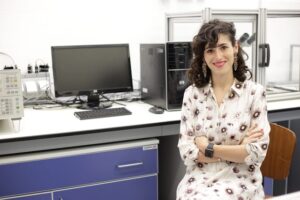10.1.2022
Potentially ground breaking post-doctoral research on biomarkers receives 2.5 million euros from the ERC
Dr. Eleonora Macchia, researcher at the Faculty of Science and Engineering at Åbo Akademi University, has received a prestigious ERC Starting Grant of close to 2.5 million euros from The European Research Council for her project NoOne: A binary sensor with single-molecule digit to discriminate biofluids enclosing zero or at least one biomarker. ERC Starting Grants are awarded to promising young researchers to work on a potentially ground breaking research idea.
The NoOne project aims to develop the process of detecting biomarkers indicating cancer, as well as viruses and bacteria in humans, animals, and plants. Biomarkers are measurable indicators of a particular disease state of an organism. There has been an increasing demand for diagnostic markers, enabling reliable and non-invasive screening of peripheral biofluids. It is also established that a universal screening against life-threatening diseases, such as cancer, or infectious disease outbreaks, can be accomplished only by combining genomic and protein marker-based tests. The NoOne project aims at conceiving, engineering, fabricating and validating a groundbreaking platform based on a single-molecule binary bioelectronic sensor, capable to reliably discriminate biofluid samples enclosing zero biomarkers from those containing just one.

The technology can be used for ultimate binary sensing of both proteins/peptides and genomic markers to enable the reliable screening of diseases such as cancer as well as viral and bacterial infections. The NoOne binary platform is designed to be portable, cost-effective, easy to operate and with a time-to-results within one hour; hence it is the ideal candidate for point-of-care applications. The prototype will enable clinicians, phytopathologists or veterinaries, to identify the set of samples that are totally free from a protein, peptide or genomic marker as well as from a pathogen (virus or bacteria), from those enclosing at least one with a confidence level of 99%. This makes the NoOne platform the best performing ever in enabling a fast, highly reliable, cost-effective identification of the subset of biological samples belonging to the potentially diseased part of a population. This is of paramount importance for predictive screening of humans, plants or animals.
NoOne will demonstrate its effectiveness in key relevant applications such as the binary detection of pancreatic cancer biomarkers, SARS-CoV-2 virus, the Xylella Fastidiosa bacterium and the assay of post translational peptides evidencing the phosphorylated forms regulating crosstalk with oncogenic signaling pathways.
The present project is highly multidisciplinary and involves cutting edge aspects of analytical chemistry, chemical engineering, materials engineering, device physics, electrochemistry, electronics, biochemistry. The research team, composed by knowledgeable scientists having complementary scientific backgrounds and skills, will involve Prof. Ronald Österbacka and Cecilia Sahlgren at Åbo Akademi University and Prof. Luisa Torsi and Maria Chironna at University of Bari. The PI will also collaborate with Prof. Irene Esposito – University of Duesseldorf, Dr. Pasquale Saldarelli – National Research Council – Bari and Prof Fabrizio Torricelli – Department of Information Engineering – University of Brescia University of Brescia.
Dr. Eleonora Macchia joined the Faculty of Science and Engineering at Åbo Akademi University in 2019 and became an Academy of Finland Post Doctoral Researcher in 2020. Recently, Dr. Macchia was appointed Assistant Professor (tenure track) at the University of Bari, Italy. In implementing the NoOne project. Dr. Macchia will maintain a double affiliation with ÅAU and UNIBA, which will also promote the collaboration between the two universities.
